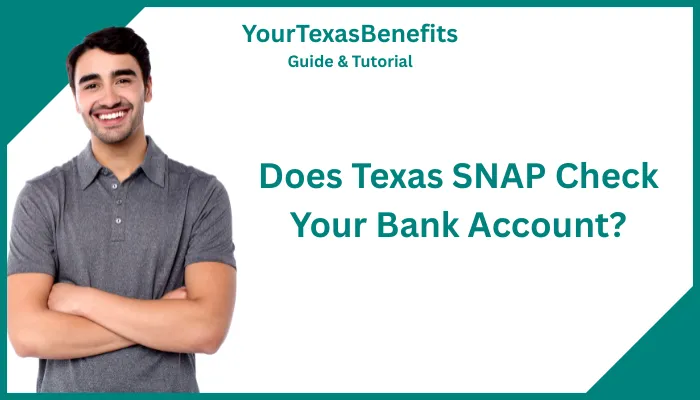If you’re applying for or already receiving food assistance, you might wonder: Does Texas SNAP check your bank account? Understanding how Texas evaluates financial eligibility for the Supplemental Nutrition Assistance Program (SNAP) is crucial. Many applicants worry about whether their savings or income could affect their benefits.
In this guide, we’ll break down how Texas SNAP determines eligibility, what financial resources count, and whether the state monitors your bank account. By the end, you’ll have a clear understanding of how your finances impact your SNAP benefits.
You can check your application status and manage your information directly through YourTexasBenefits, the official portal for benefit services in Texas.

How Texas SNAP Determines Eligibility?
Before diving into whether Texas SNAP checks your bank account, it’s important to understand how eligibility is assessed. SNAP is a federally funded program administered at the state level, meaning Texas follows both national and state-specific guidelines when reviewing applications.
Key factors Texas considers for SNAP eligibility:
- Household income – Must fall within federal poverty guidelines.
- Household size – More members generally allow for higher income limits.
- Resources and assets – Savings, cash, and certain property types may count.
- Employment status – Work requirements may apply in some cases.
Texas uses a combination of self-reported information and verification methods to ensure that only eligible households receive benefits.
Your income and assets play a role in SNAP eligibility, but does that mean the state checks your bank account directly? Let’s find out.
Does Texas SNAP Check Your Bank Account Directly?
One of the biggest concerns for applicants is: Does Texas SNAP check your bank account? The answer isn’t a simple yes or no. Texas does not have direct access to your bank account, but they do require you to report your financial resources and may ask for verification.
Here’s how it works:
| Method | Does Texas SNAP Use It? | Purpose |
|---|---|---|
| Self-Reported Information | Yes | Applicants must declare income and assets. |
| Bank Statements (Upon Request) | Sometimes | Proof of financial resources if needed. |
| Data Matching with Other Agencies | Yes | Cross-checks with employment and tax records. |
| Random Audits or Investigations | Rarely | Ensures compliance in suspected fraud cases. |
Texas SNAP typically relies on self-reported information but may request bank statements if inconsistencies arise. For example, if your reported income doesn’t match tax records, the state may ask for financial documentation.
While Texas SNAP doesn’t automatically check your bank account, they can request statements if needed. Being honest about your finances is the best way to avoid issues.
What Financial Resources Count for Texas SNAP?
If you’re still wondering, Does Texas SNAP check your bank account?, it’s helpful to understand which financial resources actually affect your eligibility. SNAP follows specific guidelines on what counts as a countable resource (assets that could impact your benefits).
Resources that count toward SNAP limits:
- Cash on hand – Any money outside of a bank account.
- Checking and savings accounts – The balance at the time of application.
- Stocks and bonds – Investments that can be easily converted to cash.
- Some vehicles – If they exceed Texas’s resource limits.
Resources that do NOT count:
- Your primary home – Not considered an asset for SNAP.
- Retirement accounts (in most cases) – IRAs and 401(k)s are usually excluded.
- Certain vehicles – If used for work or essential transportation.
As of 2025, most households must stay below $2,750 in countable resources ($4,250 for households with an elderly or disabled member). If you have more than this amount in a bank account, Texas SNAP may request verification.
Not all financial assets count against you. Knowing which ones matter can help you determine whether additional verification is needed.
What Happens if You Don’t Report Your Bank Account?
Applicants sometimes ask: Does Texas SNAP check your bank account if I don’t report it? The truth is, while Texas doesn’t have automatic access to your banking information, failing to disclose required financial details can lead to problems.
Possible consequences of failing to report assets:
- Delayed or denied application – Missing information can stall the approval process.
- Overpayment issues – If undisclosed income is later discovered, you may have to repay benefits.
- Fraud investigation – In severe cases, SNAP violations can result in penalties or disqualification.
If you’re unsure whether to report an account, it’s best to disclose it upfront rather than risk future complications.
Honesty is the best policy. Not reporting financial resources could lead to loss of benefits or even legal issues.
How to Ensure a Smooth Texas SNAP Application?
Now that you understand Does Texas SNAP check your bank account?, here are some steps to ensure a hassle-free application:
- Gather Your Financial Documents
- Bank statements from the past 1-3 months.
- Pay stubs or proof of income.
- Rental or mortgage payments.
- Double-Check Resource Limits
- Ensure your assets stay within SNAP guidelines before applying.
- Respond Promptly to Requests
- If Texas SNAP asks for verification, submit it quickly to avoid delays.
- Keep Records Updated
- Report any major changes in income or financial resources.
By following these steps, you can improve your chances of a smooth approval process while avoiding any unnecessary scrutiny.
Conclusion
So, does Texas SNAP check your bank account? The answer is that while Texas doesn’t automatically access your account, they do require you to report financial resources, and they may request statements for verification. SNAP eligibility considers your household income, savings, and countable assets, so being transparent is key.
If you’re applying for SNAP or renewing your benefits, make sure to keep your records accurate. Need assistance? Check with Texas Health and Human Services to clarify any financial concerns.
